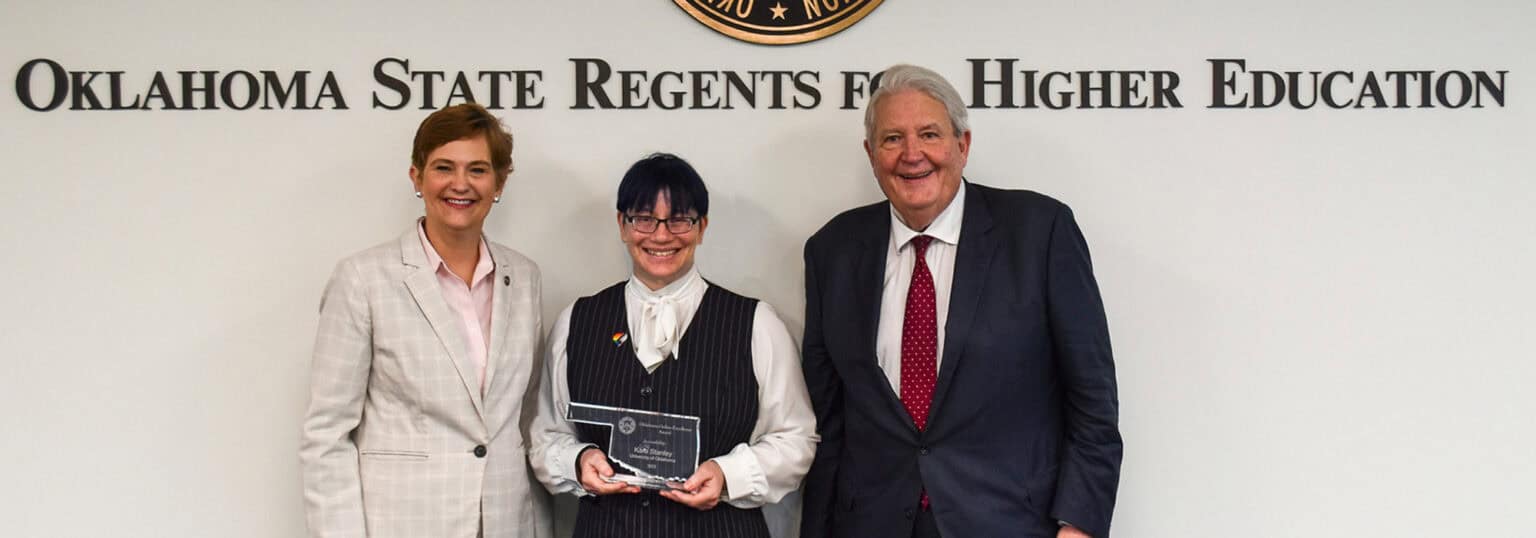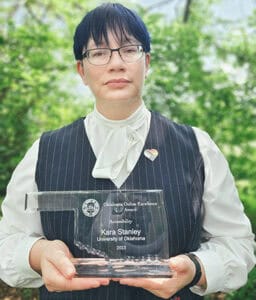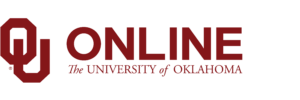YOUR FUTURE STARTS HERE
Complete the form below to learn more about our online programs and how to get started.

OUO, PACS Instructional Designer Wins Accessibility Award
by Michael Mahaffey
The Oklahoma State Regents for Higher Education presented Kara Stanley, an instructional designer for OU Online and the OU College of Professional and Continuing Studies, with the 2023 Oklahoma Online Excellence Award in Accessibility at their meeting on May 26, 2023.
Created by the Council for Online Learning Excellence (COLE), which was founded by the State Regents to strengthen the delivery of high-quality online and hybrid education opportunities for students in Oklahoma, the Online Excellence Award recognizes the outstanding contributions of faculty and staff in the categories of accessibility, innovation, individual leadership, open education impact, team leadership and teaching.
Stanley was presented with the OEA accessibility award for her leadership in making learning more accessible for students taking online courses at the University of Oklahoma.
Heading up the accessibility initiative for the OU College of Professional and Continuing Studies, she served as the functional accessibility expert, providing training and resources to co-workers as they were tasked with making all of the college’s courses accessible for both in-person and online students.
“Our goal was to get make sure everything we’re offering to students doesn’t present a barrier of accessibility,” Stanley said.
The drive by universities to begin ensuring courses were accessible began in earnest as a result of COVID-19 forcing a mass migration of universities to online learning. The deficits many schools found prompted instructional designers like Stanley and her team to work with faculty and course instructors to re-think how students interact with their courses.

Stanley, who began teaching in higher education in 2006 after earning a bachelor’s degree in agriculture and a master’s degree in plant, soil and environmental science from West Texas A&M University, said she has always tried to make her courses accessible for students.
As an instructor of biology, environmental science and earth science courses at Seminole State College, she includes alternate methods for learning to help her students understand dense and technical information without requiring extraordinary means.
“I always try to provide the reading and a video that covers the exact same material, or close enough that all of the major points are covered in both mediums,” she said, “so if a student learns better by listening, they can watch the video, or if they prefer to read, they can do that.
“If an ADHD student has trouble reading a textbook and absorbing the info, I’ve suggested students use a screen reader, and a lot of times that removes the barrier because they are able to absorb the information in a different way.”
While she had created accessible paths for the students in her classes, Stanley said she had never interacted with course materials from a student’s perspective until she began working as an instructional designer for the College of Professional and Continuing Studies (PACS) in 2020.
As a test, she turned off the monitor on her computer and tried navigating the course material she had been working on using just a screen reader. The result was eye-opening.
Realizing just how much of a challenge students with accessibility issues have even when things work correctly, she knew she needed to dig into the problem and see just how deep the widespread accessibility rabbit hole extended.
“When I really got into it, I started reading the research,” Stanley said, “and something like 70 percent of students who attempt online learning that need some form of accessibility or assistive technology drop out because they need assistance, and they can’t get it.”
Last year, Stanley and her team were given a new task – creating four new adult degree completion degrees by modifying existing courses and developing new ones that were needed.
“We had four months to create or update more than two dozen courses for regent approval, in addition to researching micro-credentialing opportunities,” she said.
With a mandate to build accessibility into the new courses from the ground up, Stanley and her team also transitioned courses that had previously been developed as survey-style courses into applied assessment courses, so students would do things in their courses that they would actually do in the real world as part of their profession.
“It was a pretty hefty lift just revising the courses, because we were doing something we’d never done before with a different format and a different way we were setting it up,” Stanley said. “These were some of the first courses the SMEs were designing with us, where they had to consider that all assignments have accessible options and really pushing alignment between course assignments and course outcomes. If you want to have a video discussion post, you have to give them a written option. If I have a student who communicates primarily through sign language, it’s only right that they submit a video post that is in sign language. No one said there had to be audio.
“We wanted to make sure these courses were good, and that they would be applicable, and students could take what they learned in their course that week and use it in their job.”
Stanley hopes that the recognition of the work she and her team has done leads to a greater drive from the university to push accessibility across the board for the benefit of both the university and the students.
“Even if it’s just starting with the programs and colleges I work with, maybe from there it expands,” she said.
She believes that as colleges approach the pending enrollment cliff, making sure OU is recognized as a certified accessible institution will be the key to the university’s success in online learning in the future.
“Being known as being accessible and getting Quality Matters certifications and for going out of our way to remove barriers will attract students to online learning who might not otherwise try it,” she said, “or bring back students who previously stopped due to barriers that we have removed and are no longer an issue to learning online.”
Stanley is currently working on a second master’s degree in instructional design and learning technology with the University of Wisconsin-Whitewater to further expand her knowledge and skillset.
“I don’t think of myself as an accessibility expert, because every day I learn new things,” she said, “and I’ve still got so much to learn. I think as an instructional designer, a faculty member and a person, every course, every time, every student. Meaning every student should be able to take every course, and every time they do, there are no barriers to materials or assignments or class. I think that is the basis for my philosophy as an instructional designer and a functional accessibility expert.
“It shouldn’t matter if you have a disability, if you are sight impaired or hearing impaired. It shouldn’t matter if you have Parkinson’s and have difficulty using a mouse. It shouldn’t matter if you have social anxiety, and the thought of appearing on camera for a video discussion gives you a panic attack. You should be able to take any course and not have a barrier present. That’s the core of everything.”
To learn more about the online programs offered by OU Online, visit the OU Online website.
OU Online
338 Cate Center Drive, Rm. 381
Norman, Oklahoma 73072
Online Programs
Quick Links
OU Online

